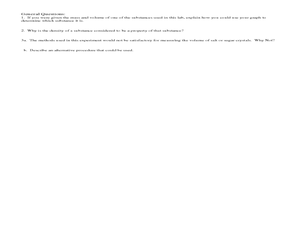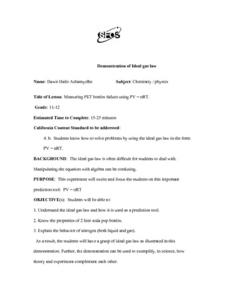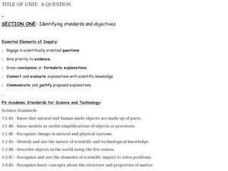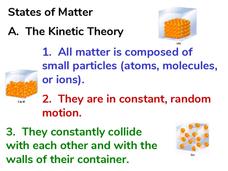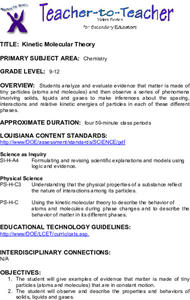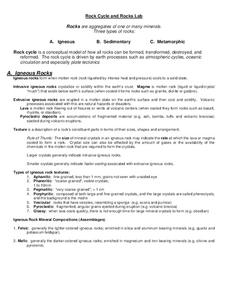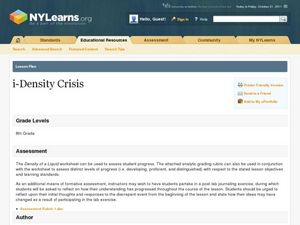Curated OER
Identifying Acids and Bases
Sixth graders observe the physical and chemical change that can occur in an acid and a base. In this acids and bases lesson plan, 6th graders use cabbage juice to identify, compare, and contrast acids and bases.
Curated OER
The Solar System: Why do we Explore?
Third graders act as scientists. In this property discovery lesson, 3rd graders explore the substance "Oobleck" (cornstarch, water, food coloring). They work in groups to investigate the substance and make observations as a scientist...
Curated OER
Science Lesson Plans
Students conduct a variety of exploration activities on various science topics. In this science lesson outline, students design a cell encapsulation to hold a specific type of medicine. They give examples of physical and chemical...
Curated OER
Water and Ice
Students study the liquid and solid states of water. In this water states lesson, students complete three experiments to study water as it cycles from a liquid state to a solid state and back. Students finish with a Venn Diagram...
Curated OER
Mass and Density of an Irregular Solid
In this physics worksheet, students determine the density of irregular solids using water displacement method to complete 7 problems and short answer questions.
Curated OER
Demonstration of Ideal Gas Law
You know that liquid nitrogen turns into a gas at room temperature. Place some in a two-liter bottle for a physics demonstration of the ideal gas law. Beware, however; this is a dangerous demonstration! Not to mention that you may not...
Curated OER
Water and Ice
Learners explore water and ice. In this physical science lesson, students participate in a science inquiry and observe the characteristics of ice and water. Learners compare the differences between a solid and liquid and record their...
Curated OER
Acids and Alkalis
This PowerPoint progresses slide-by-slide through all the facts you would want to deliver about acids, alkalis, salts, and the related lab tests. Each slide has one or two facts about a physical or chemical property or behavior. The...
Curated OER
A QUESTION
Students engage in scientifically oriented questions. They give priority to evidence, draw conclusions/formulate explanations and connect/evaluate explanations with scientific knowledge. Students communicate and justify proposed...
Curated OER
Phases of Matter
Learners comprehend the different phases of matter. They give examples of each phase and describe the processes of changing between these phases. Students are asked what is plasma? They are asked what is the four phases of matter? ...
Curated OER
Classifying Matter Game
Students identify the different states of matter. In this chemistry lesson, students differentiate the physical properties of the three states. They apply what they learned by playing a team game at the end of the lesson.
Curated OER
Sink or Swim
Students define density and explain how to determine the density of an object. Students participate in a demonstration that shows the differences in the densities of different liquids and how they affect the liquid's physical properties.
Curated OER
States of Matter
This particle PowerPoint includes many pictures to illustrate solids, liquids and gasses and the behavior of their particles.
Curated OER
Chapter 3 Worksheet Matter
In this matter instructional activity, learners answer ten questions about matter including the phase of matter, mixtures and how they are different from compounds, the physical and chemical properties of matter and the difference...
Curated OER
Kinetic Molecular Theory
High schoolers analyze and evaluate evidence that matter is made of tiny particles. They observe a series of phenomena involving solids, liquids, and gases to make inferences about the spacing, interactions and relative kinetic energies...
Curated OER
Science: Floating and Sinking Objects
Second graders discuss why some objects float while others sink. They examine various objects and predict whether or not they will sink or float. Students discover the properties needed for objects to float.
Nevada Outdoor School
Let It Snow! Let It Melt!
Winter weather offers a great opportunity to teach young scientists about the states of matter. This activity-based lesson includes a range of learning experiences, from experimenting with the rate at which ice melts...
University of New Orleans
Rock Cycle and Rocks Lab
Science rocks! Explore three types of rocks and the rock cycle with an igneous rocks experiment. Pupils discuss textures, composition, and learn how melts are formed from the Earth's crust. They weigh materials using a scientific scale...
Columbus City Schools
What’s Up with Matter?
Take a "conservative" approach to planning your next unit on mass and matter! What better way to answer "But where did the gas go?" than with a lab designed to promote good report writing, research skills, and detailed observation....
NASA
Christa's Lost Lesson: Effervescence
How are chemical reactions affected by gravity? Learners explore the phenomenon of effervescence as part of the Christa's Lost Lessons series. They compare findings in an experiment on effervescence to a video of a similar experiment in...
Teach Engineering
Quantum Dots and Colors
Introduce teams to quantum dot solutions with an activity that has them expose solutions to a blacklight, observe the colors, and take measurements. Groups graph the data and analyze the dependence between particle size and...
Curated OER
Matter, Matter, Everywhere!
Eighth graders make inquiry about the existence of matter. A definition of the word is needed before students can engage in various activities. The application of knowing about matter is done in the working of experiments.
Curated OER
Changing in Ohio
Fifth graders familiarize themselves with more abstract chemical/physical changes that are directly connected to Ohio. They use their knowledge of chemical and physical changes to distinguish these two, even though they may not be...
Curated OER
i-Density Crisis
Eighth graders determine the density using mass and volume. In this science lesson, 8th graders explain why some materials float or sink. They estimate the density of objects based on whether it floats or sinks in a liquid of known...






